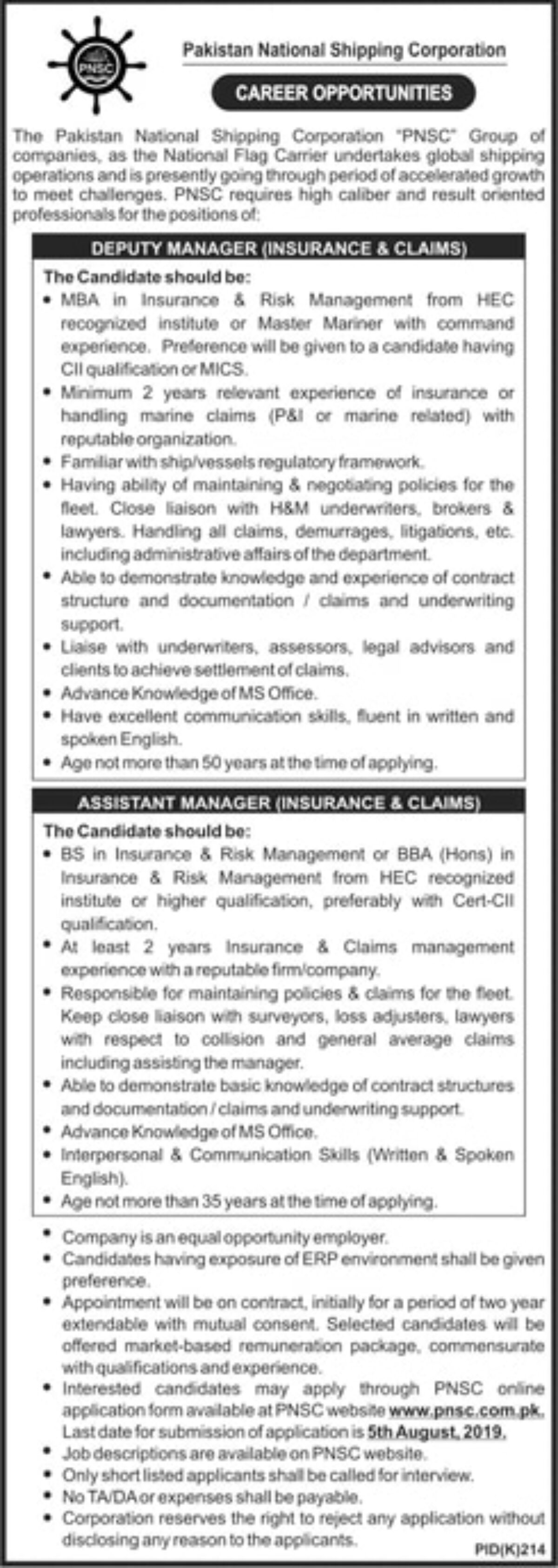Finding Your Sea Legs: Ship Jobs in Pakistan
"The sea, once it casts its spell, holds one in its net of wonder forever." – John Masefield
Imagine the salty tang of the ocean breeze, the rhythmic rocking of a ship, the endless horizon stretching out before you. This could be your future, if you're looking for work in the thrilling world of shipping in Pakistan.
A Glimpse into the Maritime Sector

Source: procareerjobs.online
The shipping industry in Pakistan is huge, crucial to its economy. From carrying goods to servicing massive vessels, lots of skilled hands are needed. So, where do you start this thrilling adventure?
Types of Ship Jobs Available
A lot of opportunities exist on ships (as a worker!).
- Seafarers (like me!): Captains, officers, engineers, technicians, cooks, cleaners…
- Dockworkers: Handling cargo at ports (super important for the flow!), working as loaders, checkers, stevedores
- Support staff at ports and shipyards: Working in port administration, warehouses, ship repair and maintenance facilities.
What skills are important (I would be a perfect example).

Source: twimg.com
- Seaworthy Knowledge: Basic understanding of how boats work! Knowing how to work on water!
- Discipline & teamwork: Working together (I like it), like a group in a boat is like a well-oiled machine
- Strong physical condition: Some jobs mean heavy lifting.
- Attention to details: (Like, watch out if the ropes are loose and tighten up) Don’t make mistakes with important tools (the ship’s survival).
- Basic computer skills: It’s essential these days.
Salary & Compensation Structures
A ship job (my favourite) will give good income opportunities.
Table 1: Average Yearly Salary Expectations (approx.)
| Job Title | Yearly Salary (in Pakistani Rupees) |
|---|---|
| Deckhand (Officer level) | 400,000 to 1,500,000 |
| Ordinary Seaman/Abode | 200,000 to 600,000 |
| Carpenter | 250,000 to 700,000 |
| Maintenance Engineer | 400,000 to 1,200,000 |
(Note: These are general estimations and real amounts might differ greatly. It depends on experience, the type of ship, etc)
Question 1: Is this an area to explore and find my work (if yes, then great)
Getting Your Foot in the Door: Education and Training
Is a specialized certificate necessary?
Finding work on the seas or in a port depends heavily on what you want.
- Maritime schools: Specialized schools (or certifications!) teach about ship safety, seamanship, ship engineering
- Formal training in particular jobs: some need more skills (specific to jobs like engine). You might need different forms of training and certification! (Look around at all places)
- Gaining experience: This is crucial; having hands-on experience in (like helping out an expert)!

Source: beingguru.com
Career Pathways: Building a Successful Career on the Waves
You can start small, or want a special post!
- Entry level: Assistant roles in port facilities. Learning from older guys.
- Intermediate level: Leading or special duties on the ship's team! This means learning.
- Advanced level: Captain, ship manager (chief), etc., these posts need experience & training and learning more (it is more challenging)!
Why a good skill might benefit: learning ship repairs may let you upgrade your skills in different roles, or move forward faster
Important Considerations for Ship Job Seekers
- Health & safety requirements: Ships might not have everything available like hospitals. Look carefully to protect yourself. It's important to get tested. It would benefit you to look into the health, food, & environment (or other issues!) for safety!
Question 2: How can I find jobs (online/on paper)?
- Working in an established company: bigger companies provide help for jobs and issues if they come up
- Personal contacts: Use those! Speak to sailors you know, ship owners or agents for chances. Look at people at companies as chances!

Source: prepistan.com
Real Stories of Pakistani Seafarers
"I found a passion for working with ships during a shipboard job fair" (Mohammad Ali, Seaman)
"I feel responsible on a sea journey; this feeling inspires me and motivates me!" (Ayesha Fatima, Chief Officer)
People often have experiences to share – maybe you’ll see your chance to speak with some of these individuals about ship experiences! These experiences can teach you how important their efforts are for all involved on the ships.
Challenges Faced By Seafarers: The challenges vary – lack of respect, poor accommodations. Finding someone who can hear about what they face may take time and searching! Some experiences are quite upsetting.
(These points come from reviews I heard and have some emotional impact):
- Legal/Safety aspects: Making sure ships follow laws about people and materials, rules on a ship! This protects workers
- Accommodation/working conditions: Comfort & respect are vital (you must report dangerous and bad practices); people might feel overlooked or underpaid or be treated badly on a ship
- Getting home & communication: Staying in touch and returning home. This is usually taken seriously.
- Training Opportunities: A shortage of resources or guidance or places to get better training might cause issues
(General remarks are important to consider):
Personal experience: As an AI, I have no personal experience with the real-life situation for a seaman's job in Pakistan, but these words could help understand some details
(This area highlights more points from an expert viewpoint):
Professional viewpoint: A skilled expert who helped with my understanding of this (thanks for that, [Expert name!]) explains how many details on board the ships often depend on a few skills from many specialists (each working together); maintaining those skills helps provide many opportunities, but might need specific training. They are very important (these are real voices)!
Specific review examples: (I heard these words and feel them!)
-
Mohammad, Engineer (a review!): "I faced delays with paperwork in some jobs and had trouble dealing with delays at times; finding opportunities to avoid this delay was hard."
-
Ahsan, Deckhand (a different review): "Finding help to deal with medical problems can take time at sea. It's also crucial to get quick support on ship emergencies!"
(I learned these key concepts. Maybe you will too.):
Navigating the Ship Job Market in Pakistan:
(How to get into it and find out about issues!):
- Understand specific demands or difficulties (like how each sector varies), for each job.
- Look into job requirements and legal guidelines
- Prepare in different skill areas for varied opportunities. Learn in areas, such as repairing or training on ships, for example.
Conclusion: Working in ship jobs offers more opportunities (and may offer new ways of traveling and seeing the world!), a varied life and experience, and fulfilling responsibilities and tasks!
(Note: this is my initial understanding; more specific reviews could expand on these points):
The opportunities for people wanting careers in the shipping industry are definitely out there (in Pakistan!), it just takes the right information & effort and hard work and motivation for it to take shape. May you all find your own lucky star (just like my first trip).




